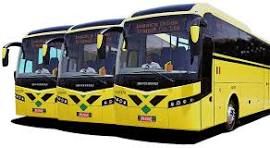
Public transportation is far too important to be treated flippantly. I hear one politician suggesting that we should scrap it and let the private sector run it. Where was he when the private sector ran it? Public transportation is critical to any attempts at development. Mobility unleashes the economic potential of our people. The single factor that currently prevents Kingston from being a 24-hour city is the lack of affordable public transportation after 10:00 pm.
Having lived in this country for so many years of my life, I have watched public transportation move from the Jamaica Omnibus Service (JOS), which moved from private to State ownership, to the dismantling of the State-owned company to create the most ramshackle transport system with the introduction of the minibus mode of transport. Against the backdrop of this “Dark Ages” mode of moving our people, the introduction of the Jamaica Urban Transport Company (JUTC) was a breath of fresh air. I have no doubt that the minibus system played a critical role in the coarsening of the sensibilities of so many of our people, especially the young.
From time to time, I have used the JUTC buses to move around the Corporate Area. Frankly, I believe it should be mandatory that all senior executives of JUTC use the service as much as possible. And this is not to punish them by any means. It is a real and necessary way for them to assess in real time how the systems they have created are working. To me it’s just common sense.
What I’ve Found
- Believe it or not, I find travelling on these buses quite pleasurable. They are comfortable, air-conditioned and yes, inexpensive and cost effective. For the most part the drivers are friendly, helpful and efficient. Some however, need urgent training in how to deal with customers. Remember that prior to the new dispensation, drivers never had to deal directly with passengers, and therefore in recruiting drivers now, the company must place a premium on customer care skills or ensure that their recruits are so prepared through company training.
- Schedules and timetables appear to be more imagined than real. It is not uncommon for buses bearing the same number to be travelling behind each other almost empty, while other buses on the route are nowhere in sight and numerous travellers stand wearily along the route.
- am not sure how useful the inspectors are in the system.
- The decision by the company to offer sub-franchises to other operators on routes that place them in direct competition with the JUTC is a poor decision. What you end up with are two groups operating by different rules. Effectively they have let loose a group of hustlers to compete directly with them. I don’t know any serious businessperson who would do this. But then the JUTC has never really been allowed to be run by serious businesspersons.
- It is still clear that JUTC has fewer buses than are required to move the population daily, hence the need to augment its fleet with the sub-franchises. From my estimation and looking at the loads they carry on most trips, there is no way that the company can be profitable in its current state. After all, a large chunk of the cash flow that it should earn is going to the sub franchises that are nimbler and more aggressive in moving passengers at lower overhead cost.
- From my information and observation, effective maintenance of the fleet is a weak link in the company. This does not surprise me one bit, as Jamaican governments have never encouraged a maintenance culture. Just look around at the police vehicles and government buildings.
- Successive governments have used the company to dump political operatives seeking jobs. No serious business can be sustained in this way.
- Some systems are not consistent, while others don’t really make business sense. For example, some bus drivers accept only the exact fare; others will not take $500 or $1,000 bills. The company does not seem to provide a minimum float to the drivers to make change to passengers. This becomes important with the current fare structure. Please be reminded that the created competitors of the JUTC do not have these issues. They will take up everyone willing to travel in their buses, while they worry about change and such matters later.
- The “Smarter Card” is a good and convenient innovation, however many passengers will not always have the resources to load such cards, and will no doubt find more comfort with the competition, which, as far as I know, will have no such requirement.
- The concessions offered to senior citizens are commendable with their use of the “Smarter Card”.
As I said at the start, public transportation is not to be treated lightly. It is central to any attempt at development. In cities around the world that thrive, critical to their success is a first-class system of moving citizens efficiently and in a cost effective manner. Most public systems depend on some level of government subsidy. That’s just the way it is. The only way the Jamaican Government can escape this is to “privatise” and leave it to the hustlers. We have been down that road before, and it was not pretty. Unfortunately, this is no way to support the development of the country. The Government has a role to play in any public transport configuration we decide to adopt. There is no escaping that.
The Way Forward
JUTC needs to build on what I believe is a good basic public transport system. It will have to consider the following:
- Determine the fleet requirements of the company.
- Identify the funding to finance its acquisition. I am not convinced that such money does not exist. It will cost the country more in subsidies not to find this funding. It may mean that Government should channel some or all the tax on gas to properly capitalize the bus company. It is that important!!
- Identify and hire qualified transport specialists to manage the company. In this way they will be in a position to do the type of analyses required to determine route loads, fleet requirements per route, and other pertinent metrics necessary to run the company like a well-oiled machine. It can be done. All it requires is the will to do it.
- Introduce a first-rate maintenance programme for its fleet to ensure maximum reliability and longevity of these critical assets.
- Resist the temptation to politicize the company. Membership in the PNP or JLP is not a qualification!
If the company can implement these basic points, I am convinced that we could create a transportation system at least for the Corporate Area of which we all could be proud. The upshot is that more persons like me would gladly park our vehicles and ride in comfort affordably around the Corporate Area. The savings to us and the country could be significant.



